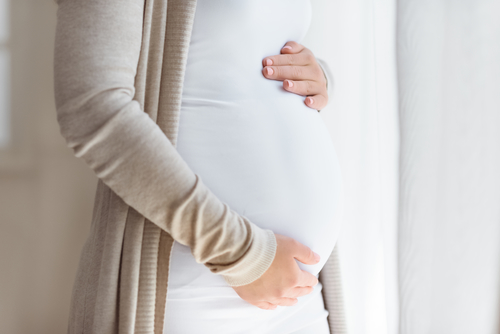Adopt hygiene and stay away from vaginal disorders! Common problems faced by women include reddening, inflammation, itching and wetness around the vaginal area. You can overcome these problems with basic precautions and natural care. Read HelloDox tips and remains aware about natural cares for vaginal disorders.
Seeing spots of blood during pregnancy is usually a cause for concern. However, it is not uncommon. The light bleeding, which is known as spotting may occur for a number of reasons.
Bleeding during the first trimester:
Spotting is most likely to happen during early pregnancy and the reasons could be many, such as:
1. Implantation bleeding. You may experience some normal spotting within the first six to 12 days after you conceive as the fertilized egg implants itself in the lining of the uterus. Some women don't realize they are pregnant because they mistake this bleeding for a light period. Usually, the bleeding is very light and lasts from a few hours to a few days.
2. Miscarriage. Because miscarriage is most common during the first 12 weeks of pregnancy, it tends to be one of the biggest concerns with first trimester bleeding. However, first trimester bleeding does not necessarily mean that you’ve lost the baby or going to miscarry. In fact, if a heartbeat is seen on ultrasound, over 90% of women who experience first trimester vaginal bleeding will not miscarry.
3. Molar pregnancy (also called gestational trophoblastic disease). This is a very rare condition in which abnormal tissue grows inside the uterus instead of a baby. In rare cases, the tissue is cancerous and can spread to other parts of the body. Other symptoms of molar pregnancy are severe nausea and vomiting, and rapid enlargement of the uterus.
Additional causes of bleeding in early pregnancy include:
-Cervical changes. During pregnancy, extra blood flows to the cervix. Intercourse or a Pap test, which cause contact with the cervix, can trigger bleeding. This type of bleeding isn't cause for concern.
-Infection. Any infection of the cervix, vagina, or a sexually transmitted infection (such as chlamydia, gonorrhea, or herpes) can cause bleeding in the first trimester.
Bleeding during the second or third trimesters:
Spotting may also occur during late pregnancy and the possible reasons are listed below.
1. Problems related to placenta like placenta previa placental abruption can also result in spotting. These are serious conditions when the placenta either covers the cervix or it gets detached from the uterine wall respectively.
2.Uterine rupture is the rare and unfortunate event when a scar from a previous surgery (like the removal of fibroid or previous caesarean scar bursts open and the baby slips into the pregnant woman's abdomen.
3.Premature labour occurs when your body is too eager to deliver the baby, usually one month before the due date of delivery.
4. Vasa Previa is another rare condition when a baby who is still developing has his blood vessels entangled in the umbilical cord or placenta-crossing the cervix. It is extremely dangerous because the blood vessels may burst open thus causing the baby to bleed and lose oxygen.
Investigating early bleeding
Your doctor is likely to begin with an internal examination to feel the size of your uterus and to look for any obvious visible sign of bleeding.
-Ultrasound: After about six weeks of pregnancy the baby’s heart beat can usually be seen on ultrasound. If you have been bleeding, you will likely be offered a vaginal ultrasound because it offers the best possible view of your pregnancy. A vaginal ultrasound is a narrow probe, which is put inside the vagina; it feels much like an internal examination and is quite safe.
-Blood tests: A blood test can measure the level of the pregnancy hormone hCG (human Chorionic Gonadotrophin), which changes depending on how pregnant you are.
Bottom line:
No matter when it occurs, any bleeding during pregnancy warrants a phone call to your doctor or midwife, even if only to confirm nothing is amiss. Be prepared to answer detailed questions about the color, amount, and timing of blood in order to best help your practitioner determine the possible cause.

Bleeding during pregnancy is relatively common and doesn’t always mean there is a problem. It can be daunting and scary. However contrary to common beliefs, bleeding need not be a necessary harmful to a pregnant woman. However, it is important to take bleeding seriously at any stage of the pregnancy.
What are the possible causes of vaginal bleeding during pregnancy?
Causes of vaginal bleeding during early pregnancy include
1.Implantation bleeding: It is a harmless light bleeding that often occurs around the time your period would have been due. It occurs when the developing embryo implants itself in the wall of the womb.
2.Cervical changes: Cervical changes due to pregnancy may sometimes cause bleeding specifically after sex.
3.Miscarriage: During early pregnancy vaginal bleeding can be a sign of miscarriage. About 1 in 5 pregnancies miscarry and usually, the cause is in the fetus and not the mother or the partner. At the same time, it is important to note that many women who bleed at this stage of pregnancy go on to have normal and successful pregnancies.
4.Ectopic pregnancy: An ectopic pregnancy is when fertilized egg implants outside the womb, for example in the fallopian tube. It can cause bleeding and is dangerous.
Early detection and appropriate management is a must in this case, so as to prevent any life-threatening complication. Other less common causes are molar pregnancy (a mass that forms inside the uterus that does not result in a baby) and problems with the cervix such as a cervical growth or cervical or vaginal infections. Vaginal bleeding might also occur during the later second or third trimester of the pregnancy.
Some of the commonly occurring includes
1.Placenta praevia (low lying placenta): This is when the placenta is attached in the lower part of the womb, near to or covering the cervix. Bleeding from a low lying placenta can be very heavy and put you and your baby at risk
2.Placental abruption: It is a serious condition in which the placenta starts to come away from the womb wall.
3.Vasa praevia: A rare condition where baby’s blood vessels run through the membranes covering the cervix. When your water breaks, these vessels are torn and cause vaginal bleeding.
Vaginal bleeding towards the end of the pregnancy is normal. Often bleeding mixed with mucous (which is called show) can be a sign of the starting of the labor.
When to visit a doctor?
It is important to keep the doctor informed about any bleeding that may have occurred at any stage of the pregnancy. A woman should carefully note details such as the type of bleeding, its texture, whether it included any tissue or clots, other symptoms such as pain and dizziness To work out what is the causing the bleeding, you may need to have a vaginal or pelvic examination, an ultrasound scan or blood tests and according to the cause and how many weeks pregnant you are it would be advised whether you need to be admitted to hospital or not and further treatment would be planned and advised.
Pregnancy is a beautiful phase for any woman, and should be enjoyed to the fullest. That being said, pregnant women need to take care of their health at all times, as a young life depends on them. Taking into account how paranoid a to-be mother can be, any form of bleeding during pregnancy can cause a lot of trepidation. However, a lot of this worry is not really required at all.
A lot of pregnant women bleed during the first trimester of their pregnancy. As a matter of fact, many who bleed do not know or realise just how common it really is, and as a result, they get quite a lot more worried than they should. In fact, it happens to about one in five women who are pregnant.
Why bleeding occurs?
-It is quite likely that if a miscarriage is to occur, it will occur during the first trimester, or the first twelve weeks. As a matter of fact, bleeding is most likely to occur between weeks five and eight. A woman would get to know that she is having a miscarriage if there is tissue which is being passed, and at the same time, she feels some very intense cramps in the lower part of the abdomen.
-Another reason why women bleed, which is also quite likely to occur during the first trimester, is due to the process of implantation. However, this sort of bleeding is not heavy by any measure. The ironic thing is that a lot of women discover that they are pregnant by this form of bleeding and it usually occurs within a week to about twelve days after the conception has taken place.
-One of the more baffling reasons for bleeding when a woman is pregnant is bleeding which occurs after sexual intercourse. While it may seem odd that something which is supposed to be pleasurable should actually end up causing blood loss, all this is a sign of is that the tissues around the vagina are receiving a great amount of blood supply. It is to be noted, that no risk is caused the foetus because of this as it is located in the uterus.
What to do if you bleed?
-No matter how light or heavy the bleeding, the midwife or the doctor must be kept up to date with the situation at hand. This is because if there is any corrective action which is to be taken, the delay in time is to be kept to a minimum.
-A cause for genuine concern over the period of the pregnancy is if there is bleeding post 20 weeks. In most circumstances, bleeding is not worth the mental trouble.
Bleeding during pregnancy is relatively common and doesn’t always mean there is a problem. It can be daunting and scary. However contrary to common beliefs, bleeding need not be a necessary harmful to a pregnant woman. However, it is important to take bleeding seriously at any stage of the pregnancy.
What are the possible causes of vaginal bleeding during pregnancy?
Causes of vaginal bleeding during early pregnancy include
1.Implantation bleeding: It is a harmless light bleeding that often occurs around the time your period would have been due. It occurs when the developing embryo implants itself in the wall of the womb.
2.Cervical changes: Cervical changes due to pregnancy may sometimes cause bleeding specifically after sex.
3.Miscarriage: During early pregnancy vaginal bleeding can be a sign of miscarriage. About 1 in 5 pregnancies miscarry and usually, the cause is in the fetus and not the mother or the partner. At the same time, it is important to note that many women who bleed at this stage of pregnancy go on to have normal and successful pregnancies.
4.Ectopic pregnancy: An ectopic pregnancy is when fertilized egg implants outside the womb, for example in the fallopian tube. It can cause bleeding and is dangerous.
Early detection and appropriate management is a must in this case, so as to prevent any life-threatening complication. Other less common causes are molar pregnancy (a mass that forms inside the uterus that does not result in a baby) and problems with the cervix such as a cervical growth or cervical or vaginal infections. Vaginal bleeding might also occur during the later second or third trimester of the pregnancy.
Some of the commonly occurring includes
1.Placenta praevia (low lying placenta): This is when the placenta is attached in the lower part of the womb, near to or covering the cervix. Bleeding from a low lying placenta can be very heavy and put you and your baby at risk
2.Placental abruption: It is a serious condition in which the placenta starts to come away from the womb wall.
3.Vasa praevia: A rare condition where baby’s blood vessels run through the membranes covering the cervix. When your water breaks, these vessels are torn and cause vaginal bleeding.
Vaginal bleeding towards the end of the pregnancy is normal. Often bleeding mixed with mucous (which is called show) can be a sign of the starting of the labor.
When to visit a doctor?
It is important to keep the doctor informed about any bleeding that may have occurred at any stage of the pregnancy. A woman should carefully note details such as the type of bleeding, its texture, whether it included any tissue or clots, other symptoms such as pain and dizziness To work out what is the causing the bleeding, you may need to have a vaginal or pelvic examination, an ultrasound scan or blood tests and according to the cause and how many weeks pregnant you are it would be advised whether you need to be admitted to hospital or not and further treatment would be planned and advised.
Menorrhagia is a condition in which a woman has heavy or prolonged periods during her regular monthly cycle. Such heavy menstrual bleeding can be inconvenient and uncomfortable, but it may also signal a more serious health problem.
Contrary to what many think, each woman's menstrual cycle has its own unique timing and variation. While the average period occurs every 28 days and lasts for four days, fluctuations between 21 and 32 days are considered normal. Soaking through a sanitary pad or tampon every two to three hours is considered a heavy period. Likewise, prolonged periods are those that last for more than seven days.
Menorrhagia: Underlying Health Concerns
A number of underlying issues can cause heavy menstrual bleeding, such as uterine fibroids, noncancerous tissues that grow in and around the uterine wall, explains Steven R. Goldstein, MD, obstetrician and gynecologist at the New York University Langone Medical Center and professor of obstetrics and gynecology at New York University School of Medicine. If you're dealing with menorrhagia, your doctor will need to rule out fibroids as a first step.
Other conditions that can cause heavy menstrual bleeding include:
Anovulation, or the ovaries' failure to produce or release mature eggs
Polyps on the endometrium, the inner lining of the uterus
Endometrial cancer
Endometrial hyperplasia, or a thickening of the uterine lining
Abnormal thyroid or pituitary gland function
Changes in hormone levels, such as at menopause
Changes in the contraceptives you take
Pelvic inflammatory disease or another infection
Changes in lifestyle and eating habits, stress, excessive weight gain or loss, travel, intense exercise, and surgery or recent trauma can also all contribute to the onset of menorrhagia.
For some women, even childbirth can be a cause. "Sometimes heavy bleeding occurs after a woman has had a child, or several children," says Dr. Goldstein. "Pregnancy causes the surface area of the uterus to expand, which means that after childbirth, there is twice as much surface area to shed through menstruation as before, hence the heavier bleeding than before childbirth."
Menorrhagia: When to See a Specialist
It's common for periods to vary in duration and flow, so there is no need to rush to the doctor when one cycle is heavy. Goldstein suggests monitoring your periods and visiting a specialist after three unusually heavy or prolonged cycles.
Your doctor may order certain tests to determine the specific cause of your menorrhagia, including:
A Pap test, which involves obtaining cells from the cervix during a pelvic exam
An endometrial biopsy, which involves inserting a thin instrument through the opening in the cervix and taking a small sample of the endometrial lining
A pelvic ultrasound, an imaging test that uses sound waves to take pictures of your internal organs
All of these are outpatient procedures, though some may require anesthesia. Test results are generally available within seven days.
Menorrhagia: Treatment Options
If other medical conditions are ruled out and you still have menorrhagia, there are several options to consider. Talk to your doctor about whether any changes in lifestyle and eating habits can help reduce menstrual bleeding or if you should consider medical treatments, which have varying degrees of effectiveness and possible side effects. According to one study, oral progestogen pills are a common treatment for menorrhagia, and yet one of the least effective. Another study found it more effective to deliver hormones through an intrauterine device (IUD) that releases synthetic progestogen levonorgestrel hormone within the uterus. And a third found that using a simple over-the-counter NSAID (non-steroidal anti-inflammatory drug), such as ibuprofen and naproxen, can reduce menstrual blood loss by up to 60 percent.
A newer option with results in the same range as NSAIDs is the drug tranexamic acid, approved by the U.S. Food and Drug Administration in late 2009. The first non-hormonal medication to be given the green light for menorrhagia, it targets a protein that helps blood to clot. Tranexamic acid does have some side effects; discuss all the pros and cons with your ob-gyn.
In severe situations, you might want to ask about surgery, such as a hysterectomy to remove your uterus (after which childbearing is no longer possible). Another option is the less radical endometrial ablation, which removes the endometrial lining so that it no longer bleeds each month. This procedure may need to be repeated in order to remain effective and should not be considered if you plan to become pregnant in the future. While women typically cannot get pregnant after endometrial ablation, it is possible and poses risks for you and the baby. Both hysterectomy and endometrial ablation are serious steps that need careful consideration.
Because menorrhagia symptoms vary from woman to woman, your physician will outline one or a combination of options to effectively treat your menorrhagia and help you to get through your monthly cycle more comfortably.












